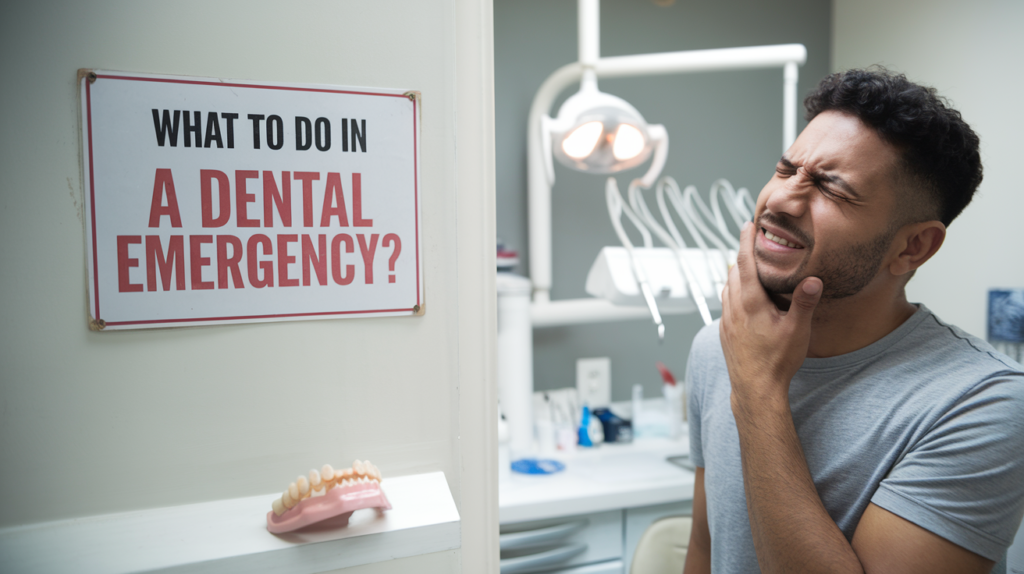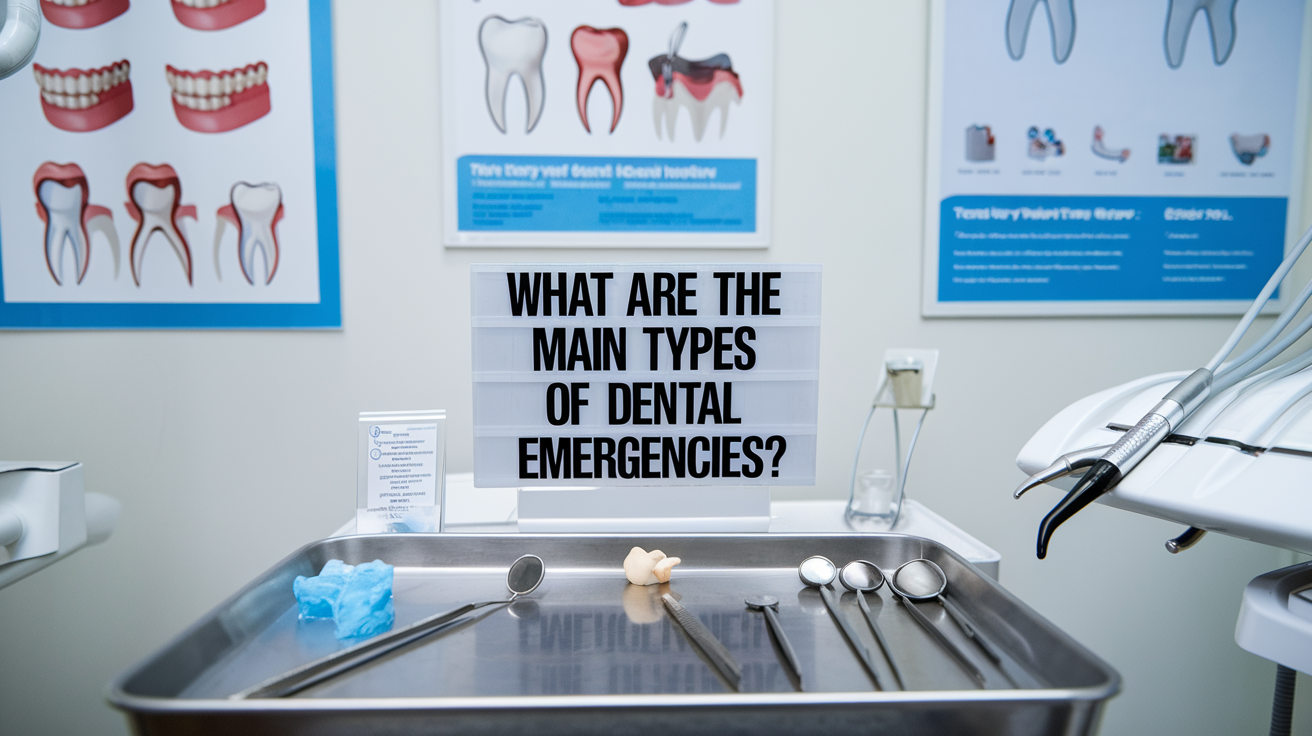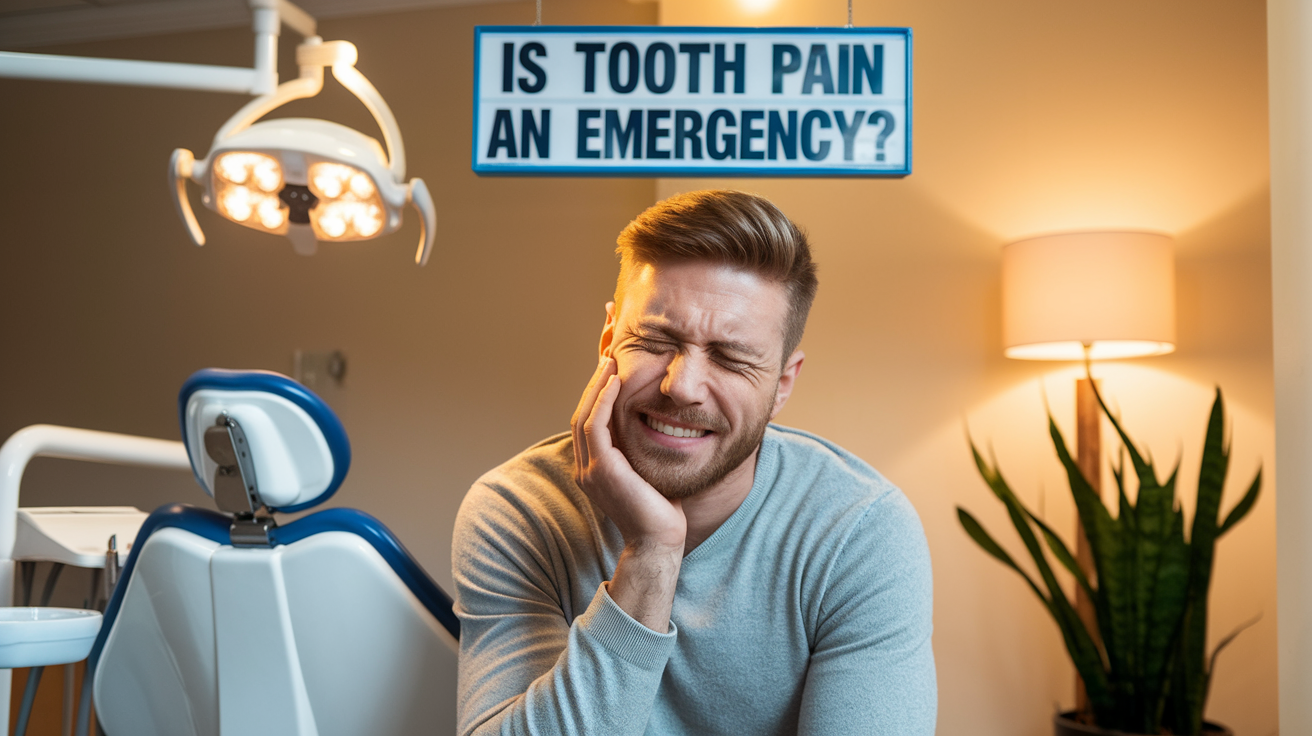Key Takeaways
- Urgent dental issues require immediate attention; when in doubt, contact your dentist.
- In emergencies, stop bleeding, preserve knocked-out teeth, and seek professional help promptly.
- Severe tooth pain with swelling or fever signals a need for urgent care.
- Good oral hygiene and regular checkups help prevent dental emergencies.
What is a dental emergency?
Imagine this: you’re enjoying a bag of popcorn at the movies, and suddenly – crunch – you bite down on an unpopped kernel, breaking off a tooth fragment. This is the kind of dental issue that can quickly spiral into severe pain and a full-blown dental crisis, demanding immediate dental care.
But what exactly qualifies as a dental emergency?
- It’s any situation that requires urgent attention from dental services to protect your oral health.
- It’s when you need to see a dentist now, not next week.
It’s not always obvious when a trip to the dentist is urgent. A simple toothache might be bearable, but if it escalates into a serious dental condition leading to major oral health issues, you’ll need emergency dental care.
Some situations are no-brainers, while others might leave you wondering, ‘Is this really an emergency?’
When in doubt, it’s always best to err on the side of caution and contact your dentist for advice.
What to do in a dental emergency?

Here’s what to do if you find yourself in a tricky dental situation:
1 – Stop the Bleeding:
If you’re experiencing excessive bleeding, grab a clean gauze or cotton swab and apply pressure to the area. If the bleeding doesn’t stop after 10 minutes, or – if it’s prolonged or uncontrolled – it’s time to seek urgent care.
2 – How to Handle a Knocked-Out Tooth or Fracture:
Rinse the knocked-out tooth with water and place it in a cup of water or a container of cold milk until you can get to your dentist. For a broken tooth, rinse with warm water and use a cold compress to reduce any swelling.
3 – Temporary Solutions for Missing Dental Work:
Lost a filling or crown? You can use dental cement from a dental emergency kit to temporarily cover the area until you can receive proper treatment.
4 – Seek Immediate Professional Help:
The steps above are just temporary fixes. Contact an emergency dentist and schedule an emergency appointment. Your dentist is there to provide compassionate care and get you the dental treatment you need.
What are the main types of dental emergencies?
Okay, so we’ve talked about what a dental emergency is – but what kinds of situations actually qualify?
Let’s take a closer look:
-
Tooth Trauma: This covers everything from tooth fractures (ouch!) and avulsed teeth (completely knocked out – double ouch!) to tooth subluxations (loose teeth). Now, if you’ve lost a tooth, try to find any broken pieces and store the tooth in milk so you can bring it with you to the dentist.
-
Infections and Pain: Bacterial infections in the mouth can spread quickly. Dental infections often cause severe pain. Keep an eye out for redness and pain that won’t quit.
-
Gum Issues: Your gum tissue can cause emergencies too. Problems such as gum disease can also lead to emergencies as advanced gum disease can cause abscesses or even tooth loss. If you have any cuts or signs of infection in your gums, don’t ignore them.
-
Broken Braces: Broken braces can still cause a lot of discomfort and even injury.
-
Severe Trauma: Accidents happen. Severe trauma to the mouth can cause oral bleeding and soft tissue injuries. If you’ve experienced any trauma to your mouth, get it checked out.
Dealing with dental pain? Don’t let sore teeth or other potential issues turn into a bigger problem. At Annex Dentistry, our emergency dentistry team is here for you, ready to handle those common emergencies and get you back on track.
Is tooth pain an emergency?
How do you know when that nagging pain is just a minor annoyance or a full-blown dental emergency?
When is tooth pain not an emergency?
If your tooth pain is mild or comes and goes, and it subsides within a day, you’re probably not dealing with an emergency. You can manage the discomfort at home with over-the-counter medication. For a natural option, try clove oil for temporary relief.
What about severe or persistent pain?
Now, if that pain is severe, throbbing, or won’t quit after 24 hours, it’s time to pay attention. This could signal a more serious issue like an abscess, which needs immediate treatment.
Are there any other red flags?
Absolutely. If your tooth pain is accompanied by swelling, fever, or pus, it’s a clear sign of a dental infection that needs urgent care.
What can you do to maintain good dental health and avoid emergencies?
Brushing twice a day, flossing regularly, and visiting your dentist for checkups are key for preventing dental emergencies.
Remember, when in doubt, always contact your dentist. They can help you determine the severity of your situation.
Can I go to the emergency for tooth pain?
Let’s look at two emergency scenarios:
Can I Go to the Emergency Room for Tooth Pain?
Usually, a toothache alone isn’t an ER situation. But, if that tooth pain comes with a fever, swelling, or trouble breathing – then yes, it’s time to head to the ER.
Those could be signs of a serious infection, possibly even a bacterial infection, that needs attention ASAP.
Can I Go to an Emergency Dentist for Tooth Pain?
For most critical dental problems, an emergency dentist is the way to go.
They’re equipped to handle all sorts of dental situations, like a fractured tooth, infections, and cuts or tears in your gingival tissue (that’s just a fancy word for your gums). Of course, maintaining good dental health through regular checkups can help prevent many of these issues in the first place.
In some cases, your emergency dentist might send you to an oral surgeon for more specialized care. But for most urgent dental issues, an emergency dentist is your go-to.
Facing a Dental Emergency?
At Annex Dentistry, we’ve been caring for the Bloor community for over 50 years. Our experienced team is here to provide prompt and compassionate care when you need it most.
Call 416-962-4022 and secure a same-day dental emergency appointment on Mondays, Tuesdays and Thursdays. Our clinic is open for same-day emergencies. This is our schedule:
- 8am-5pm on Mondays
- 8am-6pm on Tuesdays
- 8am-6pm on Thursdays
Click here to book an emergency appointment. You can call us at 416-962-4022 or find us on Google Maps.




